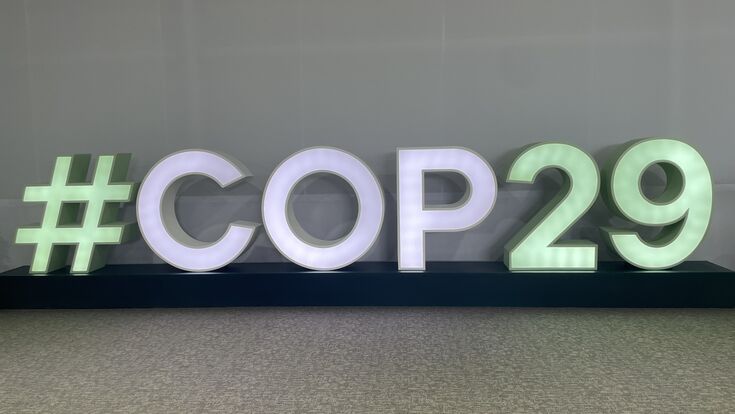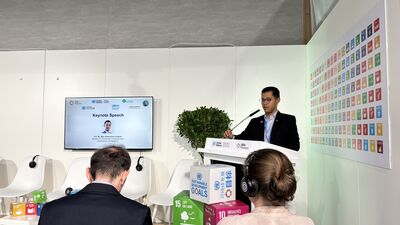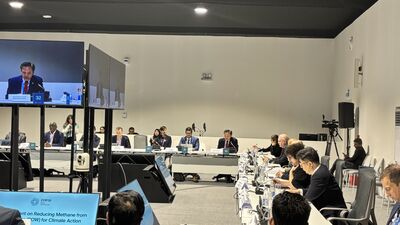COP29 : ISWA’s interventions in the Blue Zone at COP29

On Day 8 of COP29, the UN Office for Sustainable Development (UN DESA) hosted a session at the SDG Pavilion focused on “Tackling Methane Emissions and the Waste Crisis through Data, Evidence-Based Policy, and Finance.” ISWA was honoured to join a panel of experts to address this urgent issue and explore innovative solutions.
Mr. Chun Kyoo Park, Head of UN DESA, opened the session with a clear message: tackling the waste crisis requires a holistic strategy that integrates data-driven insights, financial mechanisms, and circular economy principles. “With collaboration, local, regional, and global solutions are within reach,” he emphasised.
Keynote speaker Max Andonirina Fontaine, Madagascar’s Minister of Environment and Sustainable Development, provided powerful insights from his country’s journey. While Madagascar prioritizes adaptation due to its vulnerability to climate change, the government has also recognized the potential for mitigation through sustainable waste and agricultural practices.
Minister Fontaine highlighted a critical shift in mindset: waste is no longer viewed as an uncontrollable burden but as “the new gold.” This perspective has unlocked opportunities for job creation, resource generation, and community education. He also stressed the need for domestic investment to attract international support, setting an example of national responsibility.

A recurring theme during the session was the critical gap in global waste data. Simon Gilby outlined the scale of the problem
- Of the 2.3 billion tonnes of municipal solid waste (MSW) generated annually, only 62% is managed in controlled facilities, with mismanagement concentrated in low-income countries.
- Data is fragmented and incomplete, making it difficult to measure progress effectively.
Aditi Ramola, ISWA’s Technical Director, shared findings from the Global Waste Management Outlook 2024, revealing that only 23 countries report comprehensive data on NDC’s. Rural areas, in particular, face significant challenges due to the lack of systems to collect and share waste data. Without accurate data, it is difficult to secure investment for scalable solutions or to develop tailored waste management plans.
To bridge this gap, initiatives such as learning tools, regional workshops, and community-driven reporting systems are being developed to empower stakeholders and enhance data collection.
Localizing solutions: The case of Ghana
Godfred Fiifi Boadi brought a local perspective, sharing Ghana’s innovative approach to embedding sector-specific data into its national census. With 261 municipalities, collaboration is essential to ensure accurate and actionable data.
Boadi also highlighted the importance of engaging local stakeholders in shaping Nationally Determined Contributions (NDCs). By involving municipalities through bottom-up workshops and surveys, Ghana has improved reporting protocols and fostered stronger local ownership of climate and waste management initiatives.
There is a clear call to action: data, capacity building, and collaboration must go hand-in-hand to unlock the financing needed for waste solutions. Bankable projects that prioritise local context and sustainable outcomes will be essential to addressing both methane emissions and the broader waste crisis.
Declaration on Reducing Methane from Organic Waste
On Tuesday 19 November, ISWA attended a momentous occasion in the COP’s history. For the first time, the COP Presidency released a Declaration on Reducing Methane from Organic Waste, officially putting waste on the agenda as a significant factor in the fight against climate change.
ISWA President James Law represented the Association at this meeting, standing in solidarity with national and organisational members of the community that convened to emphasise their continuing endorsement of the Global Methane Pledge and applaud the COP Presidency’s initiative to highlight the important role of waste management in reducing methane emissions.

Inger Andersen, Executive Director UN Environment Programme, underscored the critical need for immediate action: “We need to see ambition, and we need to see action. Waste is growing, and methane from organic waste represents a significant challenge. Yet, by turning ‘waste’ into wealth, we can make meaningful progress.”
The message of this declaration is very closely aligned with ISWA’s own Declaration for COP29, released in October, which highlights the critical role of organic waste management in curbing methane emissions.
James Law urged the present delegates to “work together to turn waste into opportunity, pollution into progress, and methane reduction into a tangible climate victory. The stakes could not be higher”
The session emphasised the need for immediate action, international collaboration, and innovation to address methane emissions effectively. ISWA stands proud of our previous interventions at all levels, and that the voice of the waste and resource management sector is finally being heard and included in these conversations of planet-saving action.

